|
|
|
Sort Order |
|
|
|
Items / Page
|
|
|
|
|
|
|
| Srl | Item |
| 1 |
ID:
178517
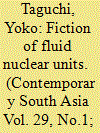

|
|
|
|
|
| Summary/Abstract |
Fictions that account for nature-culture have always been crucial for the anthropology of kinship, but the significance of fiction has increased through the extension of new technologies and global transactions. This paper examines the dynamics of householding relations in Mumbai through the lens of fiction. A contemporary middle-class household in India is a rich field of study, as it is filled with the memories of family retailers, the responsibilities and expectations of family members as well as of domestic workers and their families, and the uncertain relations of everyday life. As recent literature on domestic work and servitude suggests, these complex relations also reflect historical inequalities. By focusing on paid domestic work, this paper not only examines external inequalities but inquires into the generation and potential transformation of households and of kinship itself. It then illustrates how domestic work with entangled social imaginaries creates a new image of family, one which does not simply reflect a shift from the feudal to the modern, or from joint family to nuclear family, but rearticulates relations by evoking various fictions.
|
|
|
|
|
|
|
|
|
|
|
|
|
|
|
|
| 2 |
ID:
180056
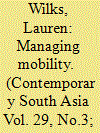

|
|
|
|
|
| Summary/Abstract |
Drawing on ethnographic fieldwork in Kolkata and rural West Bengal and engaging with literature on mobile phones in the global South, and on gender and sexuality in India, this article seeks to understand the incongruence between widespread mobile phone use in India and commuting domestic workers’ own accounts of their mobile phone use. It illustrates the important role that mobile phones play in enabling commuting workers (who are mostly women) to find work and manage relationships, but also how commuting workers play down their mobile phone use, guarding against suspicion from husbands, sons, and others. Such suspicion reflects the stigma around women’s mobility/sexuality, connected to ideas about women’s ‘honour’ and the perceived risks associated with women’s work and journeys. When workers’ mobile phone use is, then, perceived to be ‘inappropriate’, or if workers transgress norms and expectations relating to ideas about women’s ‘honour’ in other ways, they can face (further) surveillance and abuse, their access to phones thereafter often being controlled by men. Contributing to gendered analyses of mobile phones in the global South, the article shows how phones can at once create new possibilities and freedoms for commuting domestic workers while at the same time reinforcing gendered power relationships.
|
|
|
|
|
|
|
|
|
|
|
|
|
|
|
|
| 3 |
ID:
174494
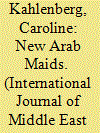

|
|
|
|
|
| Summary/Abstract |
The “new Arab woman” of the early 20th century has received much recent scholarly attention. According to the middle- and upper-class ideal, this woman was expected to strengthen the nation by efficiently managing her household, educating her children, and contributing to social causes. Yet, we cannot fully understand the “new Arab woman” without studying the domestic workers who allowed this class to exist. Domestic workers carried out much of the physical labor that let their mistresses pursue new standards of domesticity, social engagement, and participation in nationalist organizations. This article examines relationships between Arab housewives and female domestic workers in British Mandate Palestine (1920–1948) through an analysis of domestic reform articles and memoirs. Arab domestic reformers argued that elite housewives, in order to become truly modern women, had to treat maids with greater respect and adjust to the major socioeconomic changes that peasants were experiencing, yet still maintain a clear hierarchy in the home. Palestinian memoirists, meanwhile, often imagine their pre-1948 homes as a site of Palestinian national solidarity. Their memories of intimate relationships that developed between elite families and peasant maids have crucially shaped nationalist narratives that celebrate the Palestinian peasantry.
|
|
|
|
|
|
|
|
|
|
|
|
|
|
|
|
| 4 |
ID:
106073


|
|
|
| 5 |
ID:
189551
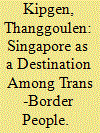

|
|
|
|
|
| Summary/Abstract |
This article analyses the significance of kinship and ethnic networks in the migration of the Kuki people from the Indo-Myanmar borderland to Singapore. In addition to facilitating the dissemination of information and the formation of collective decisions, kinship and ethnic networks are crucial in fostering a sense of community and belonging in the new destination. The article investigates the church’s function among Singapore’s Kuki population. It argues that religion deconstructs ‘otherness’ that came about when colonial rulers split the Kukis into two separate countries (India and Myanmar). The church serves as a powerful symbol of Kuki identity since it facilitates efforts for ethnic unification and allows them to revive the sense of ethnic solidarity lost for decades.
|
|
|
|
|
|
|
|
|
|
|
|
|
|
|
|
| 6 |
ID:
155799
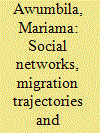

|
|
|
|
|
| Summary/Abstract |
Recent studies indicate that poor migrants are more likely to depend on social capital among other resources for livelihoods in host communities. Relying on insights from the social networks theory and using qualitative data from two migrant sending regions and one migrant destination area in Ghana, this paper examines the role and effects of networks of social capital on migration processes and livelihood strategies of migrants in the construction and domestic work sectors in Accra, Ghana. The paper argues that different categories of migrants fashion out specific migration strategies based on a complex intersection of social networks, which is shaped by specific contexts. Therefore the various ways in which migrants access, maintain and construct different types of networks in varied social locations and with diverse people needs to be interrogated in a more nuanced way and their policy implications addressed.
|
|
|
|
|
|
|
|
|
|
|
|
|
|
|
|
|
|
|
|
|